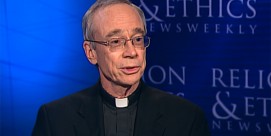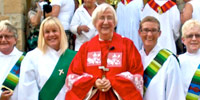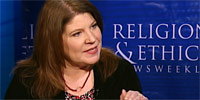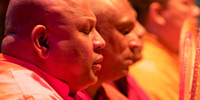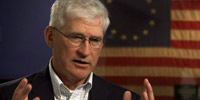In This Episode << SLIDE LEFT TO SEE ADDITIONAL SEGMENTS
Mary Gordon Extended Interview
Q: How would you define a Catholic novelist?
A: A novelist who is a Catholic — and I think it’s not about subject matter. So what exactly do David Plante, Tobias Wolff, Richard Russo, Louise Erdrich, Flannery O’Connor, Graham Greene, Evelyn Waugh, and Georges Bernanos have in common? Not a lot. But I think what Catholicism did at its best was tell us to pay attention. Things are serious and, ideally, things are a little bit more complicated than you think, and there might be a mystery behind things. What, again, I think is the genius of Catholicism is that it is incarnational, that is to say, God is human. And a novel is, by its definition, an incarnational form because it deals with the everyday, the here and now, all that Balzacian stuff — that ideally it has a vision that creates meaning and a larger sense of context. But, you know, we’re not in 1959, where we can say “the Catholic novelist” and Graham Greene says that you can be a person in the world and a Catholic and believe that, you know, at the end of the day, suffering is redemptive. It’s not like that anymore, and maybe it never was.
Q: It’s more difficult to define now?
A: Much more difficult to define, because luckily — and I’ll just talk about America now, because there probably are no European Catholic novelists anymore, because Europe is post-Christian — but I think for American Catholics most of us had to have at least a period where we left the church or were estranged from the church. Many haven’t gone back. But it’s not like, you know, we’re poster children for the church, and our relationship with the church is usually very ambivalent. Also, for most of my generation — I don’t think there are a lot of younger people who would define themselves as Catholic. The church we were brought up in is gone. So I think the temptation is to be nostalgic or to airbrush some stuff or to make it, you know, I mean, what is it, Sister Mary Ignatius or Father O’Malley. I mean, I think either temptation is to be avoided, and I think Catholic novelists who are serious, the ones that I mentioned, have avoided that polarity.
Q: Do you consider yourself a Catholic novelist?
A: Grace Paley said if you were a horse, you’d write as a horse. I am a Catholic, and I am a novelist. But to say Catholic novelist, again, it kind of smacks of 1958 where, you know, if you — if people read you and then immediately sign up for religious instruction at their local parish, you’re a success. I have absolutely no desire to proselytize, nor do I believe that, you know, Catholicism will make people’s lives better. So I write from a particular perspective, as somebody who was reared and trained with a particular set of assumptions, associations, contexts. But to say I’m a Catholic novelist suggests some sort of agenda, interestingly, in a way that to say “Jewish novelist” doesn’t. Nobody ever assumed that Bellow and Roth and Malamud wanted to make converts. But there’s a kind of attachment to the word “Catholic novelist” that I’m a little uncomfortable with. It suggests proselytizing, and that’s absolutely not what I’m interested in. What is interesting, I think, and believe me, if you want to hear things that are wrong about Catholicism, I can tell you. But there’s a kind of allowable prejudice against Catholicism. If you tell people you’re Catholic they immediately take 50 IQ points off you. And so I think that because I am perceived by people as a Catholic novelist, there is a whole group of readers that think they don’t have to read me, don’t want to read me. And so it’s kind of like if Hitler thinks you’re a Jew, you’re a Jew. People think I’m a Catholic novelist, and that affects the way I’m read, whether I think it or not.
Q: For good or for ill?
A: Yeah.
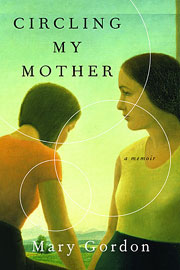
Q: Why did you decide to write this book [CIRCLING MY MOTHER] about your mother and her family and their religious life? What were you hoping to communicate?
A: Well, I didn’t decide to write the book. I found myself having written three pieces, and I looked at them and I thought, “You know, this is really a way of getting my mother back,” because my mother suffered from severe dementia for 11 years, and anybody who’s had that experience knows you lose the parent. The parent that you knew, the person that you knew, died, and then you have this sort of pathetic creature living a living death. And I wanted to get back past that, to recover a mother who was lively, gifted, difficult, and complicated, but not the pathetic creature that she was. And so I thought the way to get her back was to walk around her and think of all the different aspects of who she was — a mother, a friend, a worker, a person with a religious life, a sister.
Q: You end your book with a quotation from painter Pierre Bonnard about the relationship between looking and understanding. Could you elaborate on that idea a little bit?
A: As Bonnard says, looking is very hard work. I think that there’s a difference between glancing and looking. And, again, Simone Weil talks about the virtue of attentiveness, and I think that’s tremendously important, both for art and for life — that to look, to spend a long time looking, to look at what is not first evident, to look again, to see what’s there, to get rid of your own narcissism and to see what’s there rather than what you want to be there, I think, is a very important human exercise, and it’s the only way we can understand. It’s time-consuming, it’s painful, it’s exhausting, and it’s exactly what modern life disenables.
Q: It’s certainly what you did. You are looking so closely, almost lovingly in some passages, even as difficult as they are.
A: As I say to my students, the physical world is your friend, so sometimes when you’re trying to describe something psychological and you’re looking for psychological terms, it doesn’t work. But if you create an atmosphere or an envelope around the psychological experience, that’s often much more evocative or useful in describing an inner experience than trying to get to the inner experience without mediation.
Q: You say in the book that the dead are with us. There’s a presence. There’s no ending. What did you mean by that?
A: I really feel surrounded by my beloved dead, and there are some times where it’s almost literal, and particularly with my father, where I can say, “Hold my hand.” It’s not like, you know, there’s a hand there. We’re not talking about, you know, ghost movies. But I believe that love never ends, and if you loved and you were beloved, they’re with you. They’re around you. They can be called on. One can be accompanied by them, and I feel that very palpably. I feel that about the writers whom I’ve loved, too. And I think that’s what prayer is. We can make a connection. We can invoke those whom we have loved. I don’t think I’m going to open the closet door and see my father, and he’s going to say, you know, “Let’s go get a coffee at Starbucks.” But there is that presence that I think death doesn’t end.
Q: Let’s go back a minute to Catholics who write novels. It seems to me that a lot of the characters and even some of your characters — the most spiritual people in the books are also the ones filled with doubt. They’re the ones who are kind of messed up. Why is that significant for the Catholic writer? Why is doubt so significant?
A: I think one of the things that makes me like a certain kind of Catholicism better than a certain sort of fundamentalism is that at its best — and its best doesn’t happen that much, but let’s just pretend that it does — at its best Catholicism allows for complication and contradiction and pain. And I think what fundamentalism does and the reason why it’s so successful is it tries to flatten out contradiction, flatten out doubt, flatten out the pain. I mean, how can one believe in a loving God when one looks around and sees the horrors of the world, the suffering of children? I don’t have to enumerate all the horrors that there are. So any thinking person has to come up against the anguish and the frustration of an ideal of love and a world in which horrible suffering exists. And to not be anguished by that contradiction, I think, is almost impossible for a thinking person. So, you know, just to say, “It’s God’s will” and pretend that doesn’t hurt — that is using religion as a sort of anesthetic, and I think the most complex religious thinkers of all traditions don’t want religion to be an anesthetic. If you’re living a real religious life it should make your life harder, because you see more and you realize that wherever you stand you could be standing in another place, and that if you have a faith it’s certainly not going to be a faith that everything’s going to work out. You know, it’s not about praying to win the lottery, although I might do that. I also don’t think it’s going to work. But the complexity of a religious tradition, at its best, makes one live in contradiction, and contradiction is always painful and makes one somehow able to exist in a world in which contradiction and paradox and horrible suffering and great love exist simultaneously. So why would one not doubt? You know, you have to doubt every second.
Q: You mentioned the bias against Catholicism. Given what you’ve said about the intellectual rigor it takes to be a real person of faith, why do you feel you have to justify yourself sometimes?
A: Because the official church has acted like such idiots. You know, from the Enlightenment on the Catholic Church has placed itself against reason, against intellectual inquiry. Benedict XVI is still carrying on about modernism. If you look at Benedict, who claims to be an intellectual, he wants an intellectual life that stopped dead about 1650. And so there’s good reason to be prejudiced against the Catholic Church. It has not really said, you know — we are not on the side of free intellectual inquiry. And it has said many stupid things. It’s hard to respect a moral position that says contraception is a sin. I mean, you just have to think these people are brain-dead, so that if you then sign on with this brain-dead troupe, you must be brain-dead, too. So I absolutely understand people’s anger against the Catholic Church, and why they think, you know, it is against free thought. When Benedict XVI says he never met a homosexual you want to say you must be either the stupidest person in the world, or you’re on drugs. So when the hierarchy says these things of immense stupidity and then mandates them, as always, and people think being Catholic is signing on for that, of course they think you’ve got to be stupid or deluded. I totally understand it.
Q: But it sounds to me, beyond all of what you’re saying, that you still love being a Catholic.
A: I love being a Catholic in the same way that I love being an American, which is that most of the time I’m deeply ashamed to be both Catholic and American, and I have to believe that there is some tradition that is not immediately visible in current practice that I love very much, so that there is a way of being in the world that Catholicism, at its best, embodies, which is — everybody can be Catholic. You know, you don’t have to be Thomas Aquinas. You can be very simple and have access to great spiritual complexity and richness, so it connects you to the whole world. Rich, poor, educated, uneducated, people of all ethnicities, races — it is Catholic and I love that. It has a rich historical and cultural tradition. I like saying the same things that people said 2,000 years ago, the same words. You know, if I can say the Agnus Dei, the Lamb of God, that was being said by people in 200 AD, and in a very organic way the tradition of Western art is mine, in my fingertips, so my friends always think I’m this brilliant art historian because I can go, “Look, a Renaissance painting,” and there’s a woman holding a tray with eyes on it, and I say, “Oh, that’s St. Lucy.” And they say, “Oh, God, did you study Renaissance art?” No, when we had conjunctivitis we prayed to St. Lucy. So it’s a way of being connected. At its best, it demands social justice, social commitment, a solidarity with the poor, and it enables a very sophisticated mystical tradition. I don’t like one or the other. I don’t like, you know — sometimes the word “spiritual” makes me look for the exit sign, because it’s so solipsistic. I also think that people who only want social justice without embracing mystery and contemplation — I can’t go there either. So Catholicism at its best creates a fullness of possibilities for being human that’s very, very dear to me and people — who are willing to die for it, you know? I am of the church of Oscar Romero. I am of the church of those nuns in El Salvador who were killed. I am also of the church of Hildegard of Bingen and Shaw, Peguy, and Dorothy Day. So there are figures that I can look to who lived a life that has a fullness that’s very dear to me. What’s going on in the Vatican — not dear to me at all. What the American bishops do — not dear to me at all. But I like to think it’s too good for them. They can’t have it. They can’t keep me from it. And I guess what I feel sad about is so many of the best and the brightest are kept from their riches because of the deep stupidity and phobia of the institution.
Q: What does prayer mean to you? How do you experience prayer?
A: I think the experience of prayer and the experience of creation are very similar, and there is this kind of, again, attentiveness mixed with an openness that is necessary for both the creation of art and for prayer, so to be in that deep place where you are very, very focused and then saying “but I can’t do this by myself” and “be with me.” So it’s a sense of a desire for porosity. I think porosity is very important in both prayer and the creation of art — a moment of attentiveness and a moment when you’re outside the world and when you’re searching for a connection that quite often isn’t there. Writing and prayer both involve a lot of waiting, and I think that’s a very important discipline.
Q: You mentioned you write prayers.
A: I do.
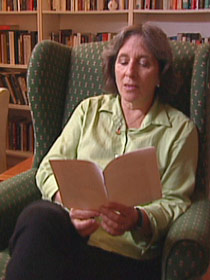
Q: What kind of prayers do you write?
A: Well, I’ve done a whole series of prayers called “prayers for the un-prayed for,” and so I have prayers for liars, prayers for people who have made mistakes, prayers for sexual love, for people who spend money on clothing, for people whose work has come to nothing. I have a series of prayers for thanksgiving for places — thanksgiving for museums and cafes and riverbanks. I have a series of prayers of contrition, prayers asking forgiveness for our sins — the sins that we might not think of, for sins of inattention, for sins of the misuse of creation. And then I’m creating prayers for new feasts — the feast in celebration of companion animals, in thanksgiving for song and thanksgiving for comedy and thanksgiving for cosmetics and fashion and thanksgiving for cuisine. I love the idea that prayers can be about anything. But there’s a kind of form. They’re repetitive and they’re accessible and yet there’s a lot of quiet in them, so I like that.
Q: Did you start doing that for yourself, or was it something you always felt you would later publish?
A: You can’t ask that question of a writer. Every writer thinks, you know, someday maybe after I’m dead they’ll find this and they’ll say, “God, she was brilliant and we didn’t even know that.” So — I just wrote them. I never think, “What am I writing this for?” I just wrote them, and then later they were published, and actually a friend of mine, Suzzy Roche who’s from The Roches [the female vocal group of three songwriting sisters from New Jersey] is putting them to music. She actually has done two of them and made songs of them, so that’s exciting for me.
Q: You’ve also talked about the relationship between literature and religion and the role of the writer or the artist in religion. I wonder if you could just talk a bit about that.
A: I really don’t know what the role of the artist in religion is. What I think is sad is the separation between art and religion now, and we’re not in an age in which religious language, religious imagery is the coin of the realm. There are realms, again, of mystery and connectedness that artists really can’t draw on anymore. I felt I had to leave the whole system of Catholic thought and education in order to be the kind of artist that I wanted to be when I was young because, again, it was a notion that you had to toe a party line, and there was a kind of anxiety in the Catholic Church that I was growing up with that if you had ambitions to the great world, you were going to leave the parish and you’d never come back. So there was a kind of tamping down of imagination in the Catholic Church I grew up in. I had to leave it to feel that I was going to go out into the world, and I knew that the idiom of the art that I wanted was not religious, and I had to explore that, and I think it’s one reason why it’s very hard to create liturgy now that is genuinely contemporary and doesn’t die in the mouth, because it’s hard to get the idiom. There are some absolutely fabulous religious works being done. There’s a Scottish composer named James MacMillan who does amazing music. He did a choral piece on the Seven Last Words that’s just amazing and very contemporary, but the contemporary idiom is not religious, so to try to include it is a kind of high-wire act that can be very, very, very difficult and, again, many religious people don’t want the complexity that contemporary art insists upon. Contemporary art doesn’t want everything tied up, even in that Graham Greene way, and too many religious people want something tied up, and so the postmodern position of not being able to stay still in one place, and the kind of, I think, oversimplified religious position that too many religious people have — there’s not a good communication between the two of them. So, you know, when the pope says that postmodernism is about not believing in anything, there’s nothing that you think is true, you know, as if we were all, you know, taking drugs and having sex with geese and that was fine — there’s such hostility between the two camps and great hostility amongst most artists to anything religious, again because they think you’re just stupid or you’re falling for something, or you’re not looking hard enough. So there’s not a good communication between the two realms.
Q: Why do we humans have a longing for beauty and meaning?
A: I don’t know. It’s a great mystery because it doesn’t seem to help us evolutionarily very much. Or maybe it does in a way that I’m not smart enough to know. But, you know, if it’s just about the strongest surviving, what does looking at a sunset do for that? I mean, supposing there’s another animal, you know. If there’s a big guy with a club behind you, you’re not going to [say] “excuse me, I’m just looking at this sunset, so could you please not hit me over the head or eat me?” So it seems to me this desire for beauty and the desire for meaning are very mysterious, and for me they’re hints of something. They’re hints of a hunger for something that is not reachable except through something transcendent, some transcendent person. But people really yearn for beauty. They define it differently, and I don’t care about that, but what is that? People can be in terrible situations of poverty, and they want to hang a flower up on the wall, or they want to paint something, or they want to wear some cloth that’s colorful. The desire to ornament and mark the desire for variety is such a wonderful human thing, and it seems to come up again and again. And why do we want meaning? I mean, it is ridiculous. You can walk across the street and be hit by car. A great artist ends up dribbling into a cup with Alzheimer’s, and good people suffer terribly. Children suffer. Bad people do very well. There shouldn’t be a desire for meaning. Life should have told us that there is no meaning, and we keep searching for it, and we keep being angry when we don’t have it. So what is that hunger? What is that appetite? I don’t know. It’s very mysterious to me. But it seems to me an important way of understanding or at least framing the question, what is it to be human?
Q: How do you think what you call “more nuanced” religions can make themselves heard?
A: I think that through their fruits you will know them. One of the ways Catholicism has made itself known in the world is by being with the poor, by taking positions of courage, and so I think that it’s not going to be about talking. It’s about being places and making a life of witness. I think that if you are with people in their grief and their joy, and you live that complexly, you’re going to draw people to you. One of the reasons that fundamentalism works — I don’t think it’s helpful to say all fundamentalists have to be stupid or wicked. It’s just that people are stupid and wicked and that’s why they’re doing this. People are terrified. I think that fear is the dominant tonality in the world now. We’re overwhelmed, and there’s a lot to be afraid of. And as I always say, I’m terrified in turbulence in the air, and so when there’s turbulence in the air I don’t want a pilot saying to me, “I’m quite well trained, and, you know, in these situations there’s a 70 percent chance that I will be able to fly the plane. But there’s that 30 percent chance — because there could be a wind sheer, and then if there’s a wind sheer, we’re really screwed.” I want a pilot when I’m in turbulence to say, “I’m going to land the plane, don’t worry.” I think most people — many people are living now as if they were in turbulence all the time and they want the captain to say, “I’m going to land the plane.” What I think is the job of a more nuanced religious tradition is to say, “I hope the plane will land. I will be with you even if it doesn’t land. I don’t understand why it might crash, but I’m with you, and I’m not going to lie to you.” I would like to think that that — but it has to be a convincing: “I will be with you.” And fundamentalists have been with people, and we — I think we have to practice “with-ness.” “With-ness” and witness will be a way of being heard and creating an alternative to the kind of screaming which breaks through the loudness of fear, because fear is very loud.
Q: You call it “the dominant narrative of fear.”
A: The dominant narrative of fear, and I think the right wing is brilliant at manipulating that. So, you know, a lot of people do want to destroy us. There are terrorists who could blow up a New York subway at any moment. Things could be in the water that would kill us all. The environment is being degraded. The economy seems to be completely out of control. Nobody seems to be able to understand the world economy anymore. So of course it’s scary. The question is how do we live with fear, and is it more scary than it used to be? So when there were plagues, when there were constant wars — that was scary, too. The point is do you live in fear or do you live in hope? Hope is not optimism. Hope is not saying it’s all going to turn out all right. But I think the challenge for a religious perspective is how do we live in a climate of fear? The fear is not wrong, but to make your decisions and your choices based on it is probably not very wise, is not very helpful. And I don’t know how to do that. I wish I did. But I think it has to be about witness, and presence, and hope against hope. And tell the truth. I’d like to think that if you tell the truth and you’re present with people, that will be more effective than saying, you know, if you send me money you’ll get a lot of money and, you know, if you pray you will be successful. Now I understand that if somebody was in the grips of an addiction, for example, that sort of fundamentalist certainty could be very helpful in a way that my more nuanced approach is not going to help. So, you know, I think there are tonalities for everybody. That’s okay. But I would like there to be at least on the airwaves a more complicated, a more nuanced, and a more truthful tone. But if we’re going to do that we have to be with people in a way that I think we’re not always so willing to be.
Q: How can a highly educated, successful woman feel comfortable in a patriarchal religion like Catholicism?
A: You can’t feel comfortable. You’d have to be, again, an idiot to feel comfortable in Catholicism. I’m not comfortable, and I’m angry all the time. So I guess what I feel — I have to take the long view and to say that the notion that women were equal to men is very new in the history of the species. I have to, you know, speak as loud as I can, not pretend it’s okay, but to say this church has a long history and it doesn’t move very quickly. But if all the women get out of it, then it’s only these creeps in the Vatican that own it. So the way that I stay is I’m a street fighter, that if I get out they win, and they’re not going to win. So it’s not comfortable. It’s an embattled position. But I think one has to be somewhat historically patient while screaming. I mean, that doesn’t sound like that makes sense, but patience and screaming, I think, is the way that I do it. Not to repress, not to say it’s okay — to keep witnessing but not to leave, because if you leave then they win, and they are not going to win without my giving them a fight.
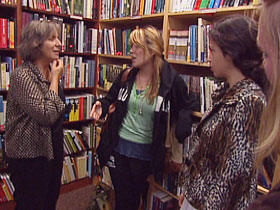
Q: Is that the type of thing you say to young women?
A: Yes, I do, and I think it’s true in all institutions. Unless women get in there and fight it’s very hard. People — men do not want women to take power alongside them. Nobody wants to give up privilege; nobody wants to give up power. I don’t, you don’t. It takes patience, and it takes witness. It takes a little wit. Sometimes you have to schmooze and entertain them a little bit and find a place where you can be together. There have got to be some things that we do agree on and to stand there, but not to get out just because it’s hard. I mean, as women we’re in a very transitional period in history — and to remember it’s very new. Women have only been voting in America for less than a century. I think women got the vote in France in something like 1960 — I mean, really bizarre. And so I think a historical patience combined with the good energy that anger can give you is the way, and that’s what I do tell the students. Don’t give up.
Q: In CIRCLING MY MOTHER you talk about the relationship between your mother, her friends, and Catholic priests. Describe the relationships that existed in those days and whether you think such close relationships could exist today.
A: Well, my mother and her friends, mostly unmarried, had very intense relations with priests who took them very seriously. Spiritually, they were their confessors, and that relationship enabled women to talk about their inner lives with men who took them seriously and paid attention. I don’t think it was sexual. I think it was romantic, and in that all romance is sexual, I guess it was sexual. But there was no placing A on B as far as I can see. But these priests made them feel connected to a larger world, and they took them seriously. So my mother went on retreats with her girlfriends, you know, and they would go away for a weekend. They would stay in convents. They would be served, they didn’t have to cook, they didn’t have to clean up. They got to pray and listen to spiritual conversations, and they adored these priests, and they did go to them for advice. Some of the advice was disastrous, some of it was helpful. But it was a connection with a man that wasn’t about keeping them in their place but was about taking them seriously and opening them up to a larger world. The whole identity of the priest is so different now. Now I have very, very close friends that are priests. But I don’t worship them, and they will ask me for advice in a way that a priest would never ask a woman for spiritual — whatever spiritual means. I mean, they might say, you know, “Do you think I should buy this car?” But they would never say, “How do you think I should adjust my prayer life?” Whereas my friends who are priests, we’re friends, and we’re kind of in it together, and we’re all struggling, and it’s not a hierarchical relationship. I mean, I love them, but I’m not romantic. I don’t think, you know — I’d rather hang out with George Clooney if I want romance, or Hugh Laurie, who I’d really like to hang out with. But priests don’t have that kind of shimmer for me that they did for my mother. They’re my friends, and we share interests, and we’re trying to figure out how to live this crazy life. There’s still, I think, probably a kind of priest and a kind of woman that wants to replicate that old way of being. But it’s almost impossible, because the shimmer around the priesthood is gone.
Q: What trends other than the obvious ones do you see circling the Catholic Church?
A: I think that the Catholic Church as I know it is not going to be recognizable in 50 years. For one thing, it’s not going to be a European church anymore. It was the Roman Catholic Church, and as it’s not going to be European, it’s going to be different from anything I know. It’s probably not going to be American either. It’s going to have to be less clerical. It could be a kind of hideous neo-colonialist institution in which people from the developing countries who thought it was their ticket to ride were in charge of it and are very conservative. There might be little samizdat groups of little sort of cells of people who are more progressive, meeting together outside institutions. Women meeting together. I just don’t know. I don’t see a lot of young people from America and Europe being very hooked into Catholicism. And so I feel that what will happen will not be recognizable to me, and it could be very, very interesting, but I don’t know what it’s going to be. It’s not going to be a Eurocentric church anymore, and as my church is very Eurocentric, I can’t really predict. It could be really great, but in ways — I have to have faith that the church always changes, and, you know, we are not the church of 1400. We’re not the church of 1700. We’re not the church of 1900. But it’s very, very hard to predict, as it will have to do with globalization, communication. I think it’ll be very interesting, because it still is the Catholic Church. It still is something that has worldwide roots. I just — I don’t know. I think it’s going to be a very interesting, unknowable time.
Q: What’s your next project?
A: I’m actually writing a book about Jesus that’s called READING JESUS, and it is an attempt to create an alternative reading practice to the fundamentalist reading practice, and an alternative to a scholarly reading practice, because it seems to me, again, you have to look at the fundamentalists and say what hunger are they feeding that the likes of us haven’t fed? So I’m trying to look at the Gospels, to look at their words and see what the words say, not what I want them to say, or what I need them to say, but really what’s there in all its complexity, and to respond to that as a person who has lived her life reading and writing, and to come to terms with the complexity, the contradictions — the parts of the Gospel I don’t like so much, the parts of the Gospel I find irreplaceable. Who is this person Jesus whom we find in words in the way that we find King Lear or Raskolnikov in words, but the relationship to words is so different? So that’s what I’m doing now. And then I’m writing a novel set in Rome.

